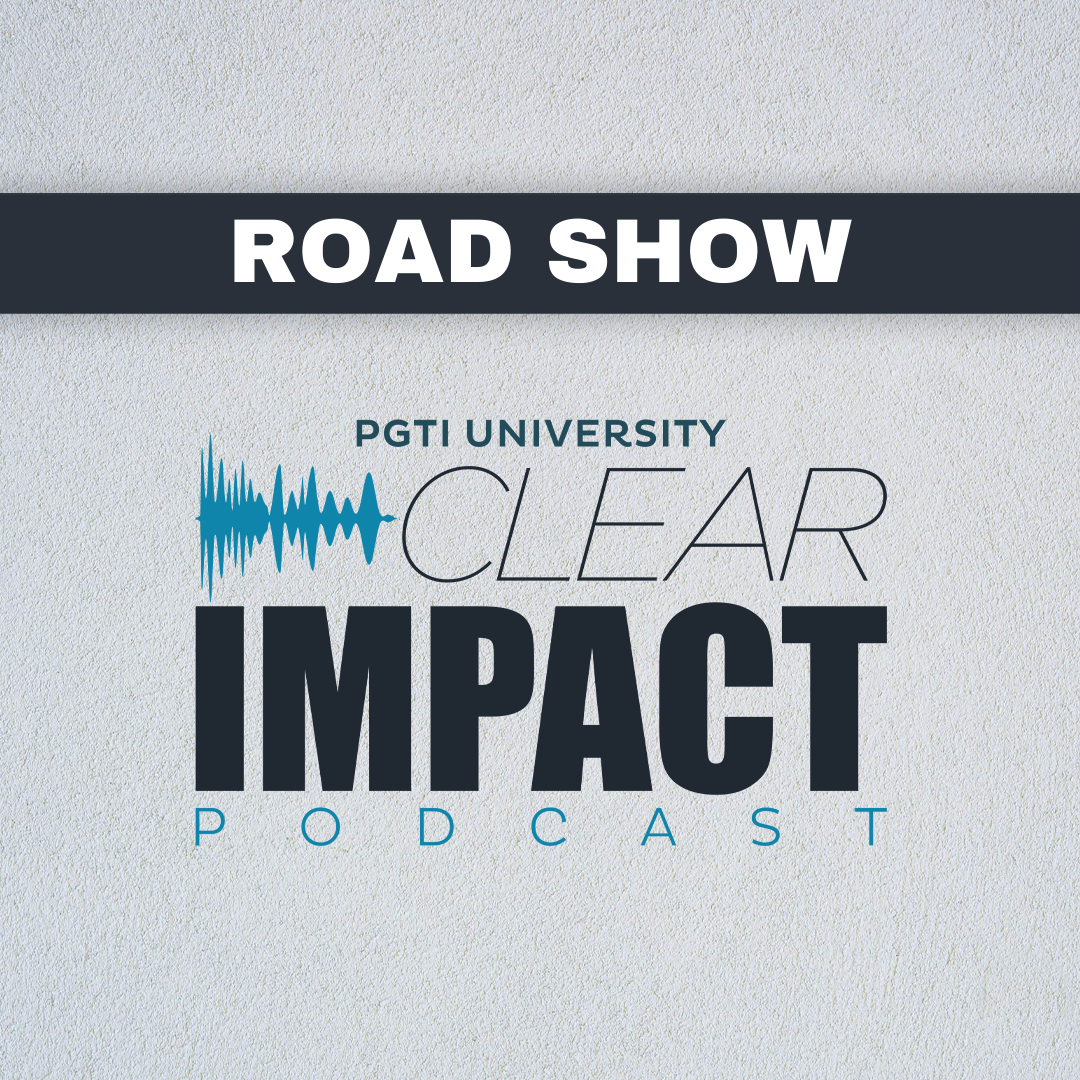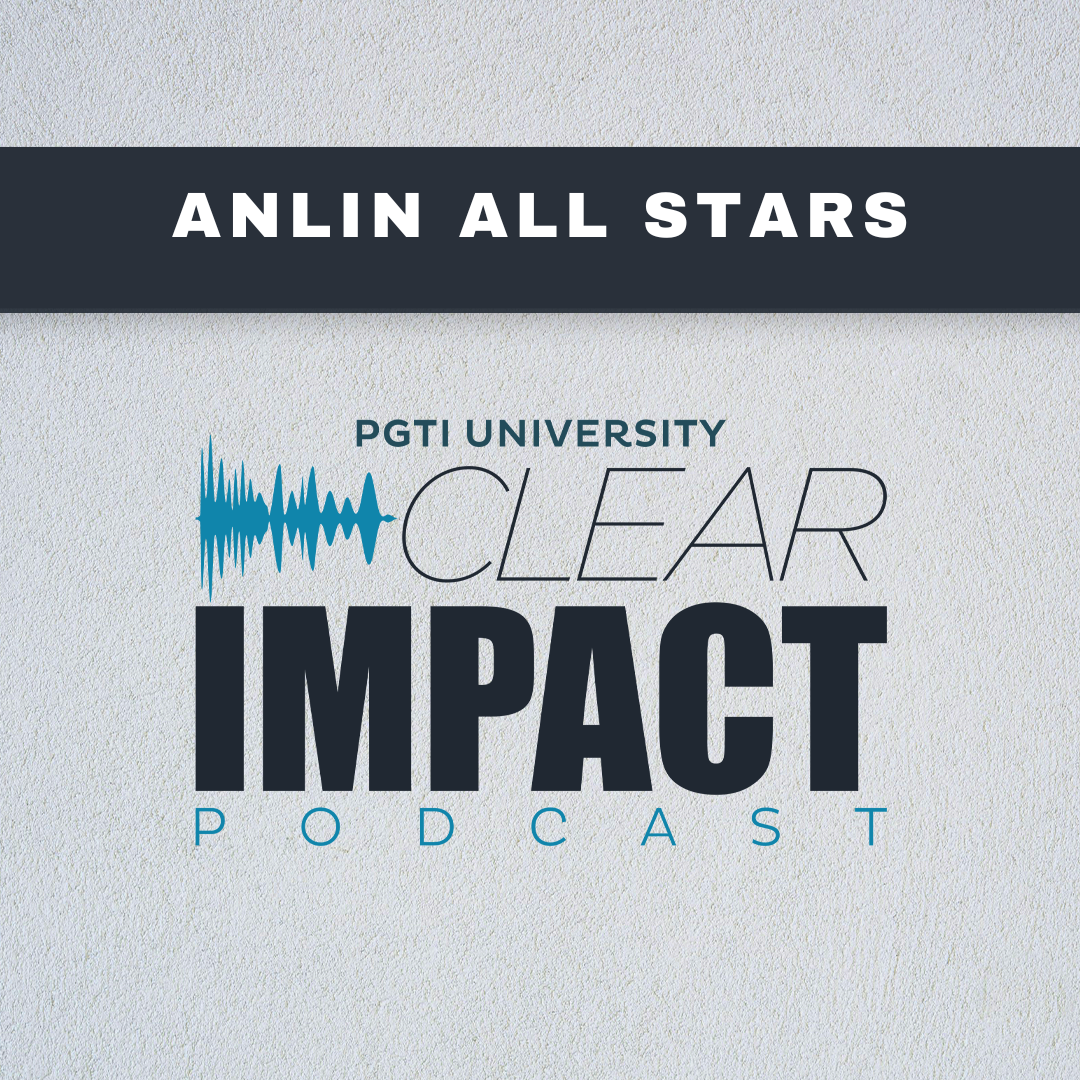Episode Transcript
Speaker 1 00:00:05 Welcome to the Clear Impact Podcast, brought to you by pg t I University. Thanks for joining us today. My name is Sherry Connor and I am your host. Good afternoon. We are here on the Clear Impact Podcast and we are in the middle of a series called Financial Wellness. And today in studio it's my honor to have Jeff Jackson, our ceo, and Brad West. Brad, what is your title now?
Speaker 2 00:00:31 Well, I'm the SVP of corporate development, so I do mergers and acquisitions and such.
Speaker 1 00:00:35 Nice. And c o that means you are obviously the Chief Executive Officer. Welcome back, both of you.
Speaker 2 00:00:43 Good to be
Speaker 3 00:00:44 Back. Great to be back. Thank you for having
Speaker 1 00:00:46 Us. Yeah, thanks for coming in. So we're talking about financial wellness and I'm so thankful that we have some really smart people in this company and the idea behind this podcast is to leverage that expertise to help our dealers be more successful in their business. And so one of the things that we wanna talk about today is short-term strategy versus long-term strategy when it comes to financial wellness. So I don't know who wants to take that one, but I'll let you guys arm wrestle over it. Well,
Speaker 2 00:01:15 We have been through a couple of downturns since Jeff and I joined roughly 17 years ago. So we've had the opportunity to see how financial wellness plays out during a lot of different situations and having a long-term strategy is how you really can manage any kind of challenges that come across in the medical environment. And we had a pretty serious one from 2008 to 2012 basically. And being cash flow positive, always making the decisions that allow you to continue to generate that positive free cash flow and to be aggressive with your sales to try to maintain as much of that revenue as you can as you go through that period, is really that strategy that helps you kind of maintain that financial wellness during that down period. And the short term, you're reacting to what the current environment is, what the competitive environment is. Right. You have competitors down the street you're reacting to. We've had some labor challenges in the last two, three years that created an inflationary environment. So that short-term strategy requires you to be pretty nimble so you can deal with all that. Right.
Speaker 3 00:02:15 Yeah. I wanna add short term strategy really focuses on cash flow. You gotta meet the day-to-day bills and uh, in order to do that to Brad's point, you gotta be nimble and able to adapt quickly to changes in market conditions, which we saw a lot of obviously through the down years of 2007 through 2011. And uh, obviously during the up years, it's just the opposite. You look more long-term horizon and investing in seeing how you can take advantage of the market as it grows. Does
Speaker 1 00:02:42 A dealer's location impact this at
Speaker 3 00:02:44 All? Not really in terms of their performance. It doesn't, cuz we have dealers in our Western brand, for instance, that are as profitable as dealers here in Florida. So location wise, it really doesn't matter. What matters with a dealer is their, I would say, business infrastructure to handle either a short term downturn in the economy in the market, or even like we've seen with the covid lift the market here in Florida and elsewhere and out west has been on fire. People have been moving out from the northeastern states into the west and south. So what we found in the upturn is a lot of dealers weren't prepared infrastructure wise, they didn't have enough warehouse space. They didn't have an efficient inventory management of their products to move them throughout their warehouse. And then secondly, they just didn't have enough, call it wherewithal in terms of installation crews to keep up with demand. Mm-hmm <affirmative>. So all of a sudden it was just the opposite of the down tire and you had an incredible surge in demand and it was hard for a lot of dealers to keep up with that demand.
Speaker 1 00:03:40 Yeah, that makes sense. And I know we're blessed, like Florida's growing, a lot of the southern states are growing and so we're not feeling that pinch that other areas are. So I think that's pretty fortunate for our crews. So are there tactical moves that can be made to preserve financial health or is it all strategy?
Speaker 3 00:03:55 I would say both. I'll let Brad add some comment, but obviously there's tactical moves. Brad mentioned earlier just being nimble enough to react quickly to changes in the market conditions and, and also I mentioned earlier, preserving cash flow, especially during downturns, you want to preserve that cash flow and make wise investments and upturns. It's how do you see into the future, how quickly and efficiently can you add to that infrastructure and get ahead of that demand curve so you don't get behind. So there's both ups and downs depending on what kind of market you're in.
Speaker 2 00:04:25 And we'll talk about this in the next couple of podcasts in the series. But in order to be tactical or strategic, you gotta have good information on which to base your decisions. So I would say what a tactical thing you can do is to make sure you're getting the data you need to be successful. Do you have good sales reporting? Do you understand how you're doing on each of your contracts? Do you know which zip codes you're doing better than others? Which zip codes have more competitive challenges than others? Those are tactical day-to-day things you need to know to be successful and be nimble. So I would say if you feel like you're a little bit in the dark and you're kind of operating in where you think you're not fully aware of all your challenges and sometimes you wish you had more information, I would definitely take some time to invest in trying to figure out how to get that information, how to get that data so that you can make better decisions.
Speaker 1 00:05:11 And so this last question, you guys can take turns on this, I think this is just good solid information. What words of advice would you have for a dealer? Maybe somebody who's newer to the industry or maybe who's just taken over the helm of an existing dealership. They might be nervous about things like interest rates and inflation and things like that. Are there any key principles you would have them follow?
Speaker 3 00:05:32 Yeah, I'll start. I would say know the workforce in your area. Know the labor pool. Be confident in the uh, infrastructure you're gonna operate in. I would also say don't focus so much on things like interest rates cuz they change and you can't stop that change. What you can do is prepare around it and be nimble enough to again, pull back demand does slow down, have enough foresight and enough strategy and your business model to adapt when demand increases, but adapt, be proactive in that adoption and invest in that infrastructure. Especially if we're a new dealer. Uh, you can't get over your skis if you're coming into a market. You're worried probably about establishing presence, cash flow up front, uh, you know, all the typical new business ownership heartaches. So you just gotta be careful in assessing the environment you're coming into.
Speaker 2 00:06:19 And then especially if you're a new dealer, understand what you're really good at and focus on being really good at that one thing, that thing that separates you in your market. If you spread yourself too thin and try to be all things, including things that you don't have a lot of experience in, then you're just gonna be frustrated. So I would definitely as a new dealer, establish a name and a presence with what I do really, really well and establish a customer base and a referral base of what I really, really do well. So then I can prove that I can expand into different things as I learn or acquire that talent or hire that talent to expand into different things. But yeah, try to be narrowly focused on to what you do really, really well when you first start off. And if you're taking over an existing business, which we certainly have a lot of our dealers in that space, then it's just make sure you really kind of know what the company's done really well in the past and how it was successful and what made who it was. And you wanna improve upon that, but you also don't wanna lose the culture of whatever you've taken over.
Speaker 1 00:07:13 Okay. That's excellent advice. See, I knew you guys were the right ones to talk to about this <laugh>. Anyway, thank you so much for your time. I really appreciate it. And we'll talk again soon. You
Speaker 3 00:07:23 Bet. Thank you.
Speaker 1 00:07:23 Thank you. Yep. All right, take care. PG t I University is the customer education team for an entire family of brands. We began with the original Easy Breeze, porch en closure line, then became P G T, America's leading brand of impact resistant windows and doors. We then added cgi, C G I C window, Western Windows Systems, new South Windows, echo windows, and doors and land, windows and doors, and our latest acquisition Martin Garage doors. We create products built to withstand major storms, keeping people safe, secure, and prepared. Our exceptional brands give you the protection you need without compromising design or functionality. PG t i University is here to educate you, our listener, so that you can be a more informed consumer of window and door products.


